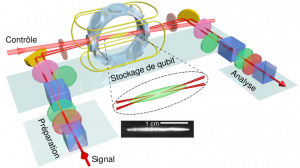Record-breaking efficiency for secure quantum memory storage
Being able to store quantum information in memories, and read it back on demand, is a key step for future quantum networks. However, until now, no memory had been able to store a quantum bit and recover it with a probability greater than 30%. This limited efficiency reduces the device performance and prevents the demonstration of the confidentiality and security of the stored information.
For the first time, researchers from the Kastler Brossel Laboratory have just carried out such a storage with a record efficiency.
In their experiment, quantum memory is based on the conversion of photonic qubit into atomic excitation in a cloud of laser-cooled cesium atoms. This technique mastered at LKB had already allowed several demonstrations in recent years, but the efficiency of this method greatly depends on the number of atoms involved.
LKB researchers have produced a very elongated cloud of cold atoms, nearly 3 cm long. Such cloud compression generally makes it difficult to store quantum bits, requiring, for example, spatial multiplexing of the cloud. In a new device, they have succeeded in combining these different ingredients, while maintaining a very low noise level.
A record efficiency of 70% was thus achieved, while preserving a fidelity with the initial quantum bit above 99%.

Efficient storage of quantum bits in a large set of cold atoms.
A quantum bit is encoded in the polarization state of a photon by phase delay plates. The signal is then separated into two channels with orthogonal polarizations, which pass through a very elongated cold atoms cloud. An additional laser beam controls the storage and playback. Compared to previous experiments, the LKB experiment combines very wide absorption of the cold atom medium, efficient multiplexing, and very low noise.
Reference : Pierre Vernaz-Gris*, Kun Huang*, Mingtao Cao, Alexandra S. Sheremet and Julien Laurat, Highly-efficient quantum memory for polarization qubits in a spatially-multiplexed cold atomic ensemble, Nature Communications, article number 363 (2018).
Available on the arXiv open archive database (https://arxiv.org/abs/1707.09372)
Researcher contact: Julien Laurat, Professor at Sorbonne University
This work was published on 25 January 2018 in the journal Nature Communications.
Article by CNRS : www.cnrs.fr
